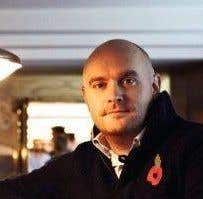This article was also published in the Financial Times.
Ten days before Will Beckett (pictured left by Fred McGregor) and his partner Huw Gott, both 35, officially opened their fourth and largest Hawksmoor restaurant on Regent Street, Beckett sent an email to his wife, Maria. It read, 'I love you very much but sadly I won't be seeing you for the next fortnight.'
I know this because I was standing beside Beckett as he sent it, an hour before the restaurant's soft opening when they were offering 50% discount to family and friends ('and just watch how many lobsters we sell at these prices' he remarked). The cocktail bar still looked like a furniture store while the main part of the 230-seater restaurant was taken over by staff who were receiving the last of their numerous briefings before the curtain rose for the very first time.
I had taken up this position because I wanted to corroborate what I suspected, that overall service levels in most restaurants certainly in the UK and the US have never been higher.
Now I realise that this may be a controversial claim but I nevertheless believe this to be true.
There are numerous factors at play. Competition, and the sheer number of restaurants today, plays its part, as does the fact that so many good places are relatively inexpensive so that those who work in them can afford to be customers too.
And the best waiters can earn much better money than they used to. A good waiter at Hawksmoor, where the average bill is £65 per head, can earn £30,000 a year. It can be almost double that at Babbo in New York, Joe Bastianich's stylish and frantically busy Italian restaurant. And even more for those who have worked their way up the ladder at Zuma, Knightsbridge, where the highest tippers in London reputedly congregate.
But what I wanted to learn from Beckett, whose dress style, like that of his partner, can best be described as casual, were the details of the more formal training that has to take place in their company which now employs 380, of which 120 jobs have just been created by this new opening.
his partner, can best be described as casual, were the details of the more formal training that has to take place in their company which now employs 380, of which 120 jobs have just been created by this new opening.
My lessons took place in three different locations, the first two in rooms tucked away in this labyrinthine 10,000 sq ft site.
Inside a room marked 'Cool Kids Office' were four thick manuals, marked Floor, Bar, Kitchen and Reservations. These were mandatory reading for all staff and, while they included predictable information on the cuts of meat, the relative prices of steaks in the increasing number of steak restaurants in the West End and the relative prices of the red wines to accompany them, what struck me most was the openness with which this information was laid out. One section was headed 'How to make a small fortune in a restaurant – start with a large one' that set out quite clearly for the waiters the financial reasons why neither Beckett nor Gott were going to get rich quick on the back of their hard work.
I was deep in this when Beckett pulled on my sleeve, led me down at least three staircases past a cupboard marked Charcoal Store and into a large classroom that during the evening becomes the staff canteen, where JB Hall, their Training Manager, was urging his laptop to reveal his Powerpoint presentation.
His mission in the last 30 minutes before the restaurant opened was to reiterate several home truths. That their role as waiters was to supply 49% service, the rational processing of any customer's order, and 51% hospitality. And this sense of hospitality, he emphasized, 'has to come from the heart'.
He backed this up with several service points such as 'the base of any glass belongs to the restaurant, the top to the customer'; that a tray must never be put on a table; and that when serving customers who are sharing a main course they must always put the side dishes down first, to allow for what he referred to as 'the big reveal' of the main course.'
As the waiters dispersed to the restaurant, Beckett and I followed. Over a distinctly unmeaty lunch of shrimps on toast and turbot with anchovy hollandaise (this outpost has a far higher fish quotient), I asked him what had been the influences that had most affected him as a restaurateur in striving for the highest service levels.
'I think the first has been the move away from the formal French model, where the food was revered above all else, to the American, more relaxed version. We've all taken New York restaurateur Danny Meyer's book, Setting The Table very much to heart.
'Then there's the principle Huw and I firmly believe in, that if the waiting staff are allowed to express themselves by wearing their own clothes, then they are happier at work and therefore even better at looking after our customers,' he added before jotting down my comments, and his own, on the food.
'But, finally, it's the competition. Out there, there is a whole bunch of successful restaurateurs, far more experienced than we are, who have set exceptionally high service standards. And I almost feel that without boasting about it they do their job and say "go on, beat us, if you can".'
And with a smile, he added 'And that's just what we have to do seven days a week.'
Hawksmoor, 5a Air Street, just off Regent Street, London W1J 0AD, 020 7406 3980
www.thehawksmoor.com

